|
|
|
Sort Order |
|
|
|
Items / Page
|
|
|
|
|
|
|
| Srl | Item |
| 1 |
ID:
153015
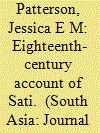

|
|
|
|
|
| Summary/Abstract |
Writing in the period 1765–79, John Zephaniah Holwell, temporary governor of Bengal, was one of the first British writers to attempt a scholarly engagement with Hinduism. Despite being an important source for several Enlightenment writers, his work has been misrepresented by current scholarship. In particular, his account of ‘voluntary sacrifice’, or sati, has been misunderstood as an example of eighteenth-century rationalism. This article will correct this by situating the account in a much fuller appreciation of Holwell's ‘project’, which can be broadly understood as an attempt to reconcile his own heterodox Christianity with what he termed ‘Gentoo’ doctrines. It will show how Holwell's insistence on the essential truth of ‘metempsychosis’ reveals an account of sati that is far more invested in presenting a particular reading of Indian religious principles than has hitherto been appreciated. This analysis challenges certain assumptions in the historiography of eighteenth-century European encounters with India, with a particular emphasis on intellectual culture.
|
|
|
|
|
|
|
|
|
|
|
|
|
|
|
|
| 2 |
ID:
094012
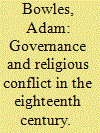

|
|
|
|
|
| Publication |
2010.
|
| Summary/Abstract |
Over the last couple of decades, it has become fashionable in some quarters to attribute the apparent rise of communal discord in colonial and post-colonial South Asia to the imposition on India of a 'modern secularist' ideology imported from the West. This foreign imposition, we are told, has undermined the conditions that enabled Indians associated with different religious and social identities to live side by side in relative harmony-conditions sometimes referred to as provided by something like (to paraphrase) a 'tradition of Indian tolerance rooted in its composite culture'.
|
|
|
|
|
|
|
|
|
|
|
|
|
|
|
|
| 3 |
ID:
093090


|
|
|
|
|
| Publication |
2009.
|
| Summary/Abstract |
Mundane knowledge of how information flows is essential for a proper understanding of large organisations and complex activities. It gives us valuable insights into the prevailing constraints of the era and the creative responses that enabled the demands of its cosmopolitan residents to be met. Though the sinews of communication have been a major topic of historical inquiry in recent decades, the focus has been decidedly uneven; much of the attention has been directed towards modern times and, for earlier periods, has been confined almost entirely to Europe, the western European empires and those sectors of the world's political economy in which Europeans had a stake. The rest of the world, in comparison, has been neglected, which may be seen clearly in the case of early modern India and the Middle East. This paper seeks to rectify the imbalance by offering a typology for making sense of how packages of low weight and high value were collected, transported and delivered over long distances within the region in the eighteenth century. While drawing on a wide range of sources, at the core of this analysis lies the correspondence of the headmen of a group-the Aiyangar pattamars-who specialised as couriers in pre-colonial southern India. Among the principal claims set forth are that there existed in this period two basic modes of private communication: in one, personal trust was paramount, in the other, the mode was effectively monopolised by recognised communities providing the necessary informational services within their cultural domain. These claims, if sustained, have major implications for current views on early modern India and the Middle East.
|
|
|
|
|
|
|
|
|
|
|
|
|
|
|
|
| 4 |
ID:
124131
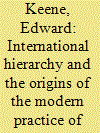

|
|
|
|
|
| Publication |
2013.
|
| Summary/Abstract |
This article argues that hierarchy plays an important role in shaping the practice of intervention, and that the changing nature of international hierarchy is a crucial part of the story of how the modern practice of intervention emerged. It describes the early modern order of precedence, and contends that it was ill-suited to encouraging people to recognise intervention as a distinctive kind of practice. However, over the course of the eighteenth century the structure of international hierarchy changed, with the emergence of a new kind of grading of powers, which provided the context for the development of a practice of intervention after 1815.
|
|
|
|
|
|
|
|
|
|
|
|
|
|
|
|
| 5 |
ID:
120729
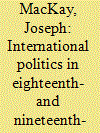

|
|
|
|
|
| Publication |
2013.
|
| Summary/Abstract |
Using historical analysis of relations between city-states and other international actors in Central Asia during the eighteenth and nineteenth centuries, this article evaluates new structural theories of international politics, chiefly those of David Lake and Jack Donnelly. Pre-colonial Central Asia offers a usefully tough case for structural theories, since it so little resembles the modern international order that these theories were developed to describe. Empirically, the article proceeds by evaluating the region's city-states' relations with three groups of actors: one another; neighbouring empires; and the many non-state actors present at the time. It concludes with an assessment of the merits of the new structuralisms, and a discussion of their value for constructivist international-relations theories of international change.
|
|
|
|
|
|
|
|
|
|
|
|
|
|
|
|
| 6 |
ID:
141839


|
|
|
|
|
| Publication |
London, WeidenFeld and Nicolson, 1968.
|
| Description |
xvii, 460p.: ill., mapshbk
|
| Series |
Asia-Africa Series of Modern Histories
|
| Standard Number |
29776201X
|
|
|
|
|
|
|
|
|
|
|
|
Copies: C:1/I:0,R:0,Q:0
Circulation
| Accession# | Call# | Current Location | Status | Policy | Location |
| 004331 | 951.73/BAW 004331 | Main | On Shelf | General | |
|
|
|
|
| 7 |
ID:
089359


|
|
|
|
|
| Publication |
2009.
|
| Summary/Abstract |
While trade in opium was of limited financial significance in the eighteenth century to the larger accounts of the Dutch East India Company as a whole, this article shows its critical importance to the Company's comptoir accounts at Batavia. The article examines the VOC's commercial operations at Batavia in the eighteenth century and places opium trade and ipium revenues within that larger context. It examines how the trade in Bengal opium through Batavia changed over time, based on a statistical analysis of the Company's accounts.These results show that opium dwarfed all other individual or groups of commodities that were available to the Company to sell profitably on Java and in the Indonesian Archipelago over the long eighteenth century.
|
|
|
|
|
|
|
|
|
|
|
|
|
|
|
|
| 8 |
ID:
140446
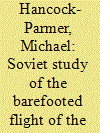

|
|
|
|
|
| Summary/Abstract |
The defeat, devastation and exile of the Kazakhs in the early eighteenth century, commonly known as the Barefooted Flight, was the nation's most distressing pre-Soviet calamity. Kazakh nation-building and official remembrance projects – commemorated in state ceremonies, public education and popular culture – portray an uninterrupted, centuries-old practice of tribute to local heroes who challenged the foreign aggressors. Twentieth-century Kazakh and Russian intellectuals in the Soviet and post-Soviet eras studied and enshrined these events based on published, secondary sources, rarely giving attention to the thin trail of documents preserved in state archives. The historiography of the Barefooted Flight exposed a trend in how politically convenient historical lessons shaped the interpretation of events. By the end of the Soviet Union, some archival material was introduced, it was but misquoted so as not to challenge the current interpretation.
|
|
|
|
|
|
|
|
|
|
|
|
|
|
|
|
| 9 |
ID:
174428
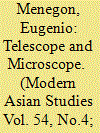

|
|
|
|
|
| Summary/Abstract |
One of the challenges of global history is to bridge the particularities of individual lives and trajectories with the macro-historical patterns that develop over space and time. Italian micro-history, particularly popular in the 1980s–1990s, has excavated the lives of small communities or individuals to test the findings of serial history and macro-historical approaches. Micro-history in the Anglophone world has instead focused more on narrative itself, and has shown, with some exceptions, less interest for ampler historiographical conclusions.
|
|
|
|
|
|
|
|
|
|
|
|
|
|
|
|
|
|
|
|
|